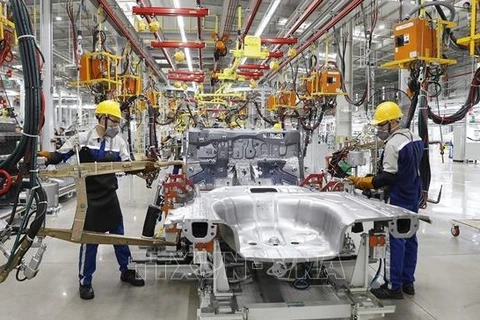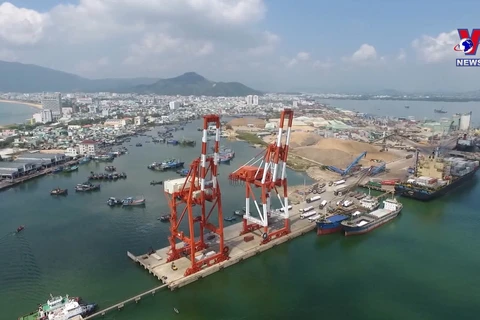 Vietnam has implemented strong solutions to support the development of the digital economy. (Photo: Vietnam+)
Vietnam has implemented strong solutions to support the development of the digital economy. (Photo: Vietnam+) Hanoi (VNA) – Vietnam should focus on improving the micro economy, and revamping its institutional systems, making it more friendly towards innovation and the environment. At the same time, it should effectively deal with risks in the uncertain international economic environment, heard a workshop in Hanoi on June 12.
The workshop, jointly held by the Central Institute for Economic Management (CIEM) under the Ministry of Planning and Investment and the German development agency (GIZ), released a report on Vietnam’s economy in 2022 and prospects for 2023.
High growth in digital economy
The report sketched out two scenarios for Vietnam’s economy.
Under the first, the national GDP will grow 6.47%, inflation 4.08%, and export 7.21%, while trade surplus is projected at 5.64 billion USD.
The figures are set at 6.83%, 3.69%, 8.43% and 8.15 billion USD under the second.
CIEM Director Tran Thi Hong Minh said economic growth mainly depends on the diversification of export markets, together with the utilisation of free trade agreements (FTAs) and the handling of risks associated with trade-technology confrontations between powers.
The report reviewed Vietnam’s Doi Moi (Renewal), initiated in 1986, during which Vietnam has focused on reforming market-oriented economic institutions, stabilising the macro economy, and integrating into the global economy.
During the 1989-1996, 2000-2007, and 2014-2019 periods, Vietnam strongly integrated into the world, made basic reforms and reaped significant socioeconomic achievements, it pointed out.
Thanks to such efforts, trade revenue remained positive despite adverse impacts caused by the US-China tension as well as the COVID-19 pandemic.
Vietnam has been seen as a promising e-commerce market globally, according to the report.
Meanwhile, a report by Google, Temasek and Bain & Company said Vietnam is expected to post an annual growth of 31% in gross merchandise value (GMV) from 23 billion USD in 2022 to 49 billion USD in 2025.
Over the past years, regional countries have made efforts in boosting cooperation in the digital economy and e-commerce, particularly paperless trade, notably “The Framework Agreement on Facilitation of Cross-border Paperless Trade in Asia and the Pacific” of the United Nations (UN), which entered came into force in February 2021.
Paperless trade
Nguyen Anh Duong, head of the CIEM's General Research Department, emphasised that given the lowering economic growth seen in the long run, the government is seeking new economic engines, including the digital economy.
 Vietnam has adopted strong solutions in support of the digital economy as well as the digitalisation of public services. (Photo: VietnamPlus)
Vietnam has adopted strong solutions in support of the digital economy as well as the digitalisation of public services. (Photo: VietnamPlus) Vietnam has adopted strong solutions in support of the digital economy as well as the digitalisation of public services, he continued.
Vietnam has seen improvements in both paperless trade in general and cross-border paperless trade in particular.
Compared to other APEC member economies, Vietnam still lacks mechanisms to support digital commerce, he however pointed out.
In order to raise technical readiness for the cross-border paperless trade, Duong recommended that Vietnam should update the membership and action plan for the the National Steering Committee on ASEAN Single Window and the National Single Window, while facilitating trade during the 2023-2025 period, with priority given to building technical capacity for cross-border paperless trade.
In addition, the customs sector needs to build a concentrated, smartly integrated information technology system to support cross-border paperless trade. High-quality broadband infrastructure should be built and upgraded nationwide.
Duong suggested Vietnam consider a national data exchange platform to connect, integrate and share data between information systems and databases of ministries, sectors and local authorities nationwide, and capacity building programmes in order to promote paperless trade and cross-border paperless trade.
Dennis Quennet, Chief Advisor of the Macroeconomic Reforms/Green Growth Programme in Vietnam run by the German Agency for Sustainable Development (GIZ), lauded Vietnam for its impressive growth in 2022.
However, many of Vietnam’s economic partners are facing multiple difficulties and challenges in 2023, he pointed out, suggesting the Southeast Asian country assess its growth quality to make suitable adjustments in order to create and then maintain momentum in the year./.























